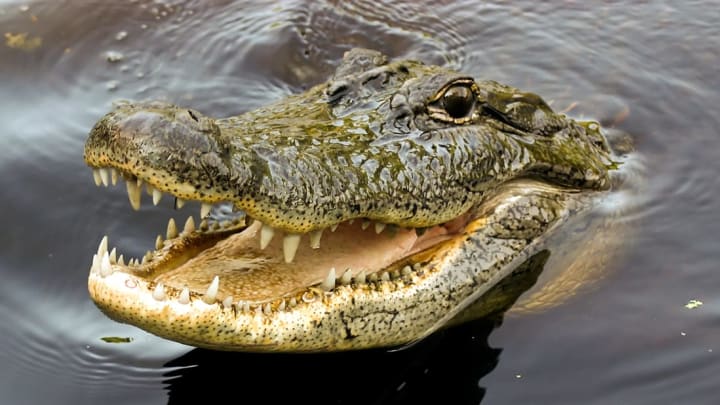The Ig Nobel Prizes are back, and this year's winning selection of odd scientific research topics is as weird as ever. As The Guardian reports, the 27th annual awards of highly improbable studies "that first make people laugh, then make them think" were handed out on September 14 at a theater at Harvard University. The awards, sponsored by the Annals of Improbable Research, honor research you never would have thought someone would take the time (or the funding) to study, much less would be published.
The 2017 highlights include a study on whether cats can be both a liquid and a solid at the same time and one on whether the presence of a live crocodile can impact the behavior of gamblers. Below, we present the winners from each of the 10 categories, each weirder and more delightful than the last.
PHYSICS
"For using fluid dynamics to probe the question 'Can a Cat Be Both a Solid and a Liquid?'"
Winner: Marc-Antoine Fardin
Study: "On the Rheology of Cats," published in Rheology Bulletin [PDF]
ECONOMICS
"For their experiments to see how contact with a live crocodile affects a person's willingness to gamble."
Winners: Matthew J. Rockloff and Nancy Greer
Study: "Never Smile at a Crocodile: Betting on Electronic Gaming Machines is Intensified by Reptile-Induced Arousal," published in the Journal of Gambling Studies
ANATOMY
"For his medical research study 'Why Do Old Men Have Big Ears?'"
Winner: James A. Heathcote
Study: "Why Do Old Men Have Big Ears?" published in the BMJ
BIOLOGY
"For their discovery of a female penis, and a male vagina, in a cave insect."
Winners: Kazunori Yoshizawa, Rodrigo L. Ferreira, Yoshitaka Kamimura, and Charles Lienhard (who delivered their acceptance speech via video from inside a cave)
Study: "Female Penis, Male Vagina and Their Correlated Evolution in a Cave Insect," published in Current Biology
FLUID DYNAMICS
"For studying the dynamics of liquid-sloshing, to learn what happens when a person walks backwards while carrying a cup of coffee."
Winner: Jiwon Han
Study: "A Study on the Coffee Spilling Phenomena in the Low Impulse Regime," published in Achievements in the Life Sciences
NUTRITION
"For the first scientific report of human blood in the diet of the hairy-legged vampire bat."
Winners: Fernanda Ito, Enrico Bernard, and Rodrigo A. Torres
Study: "What is for Dinner? First Report of Human Blood in the Diet of the Hairy-Legged Vampire Bat Diphylla ecaudata," published in Acta Chiropterologica
MEDICINE
"For using advanced brain-scanning technology to measure the extent to which some people are disgusted by cheese."
Winners: Jean-Pierre Royet, David Meunier, Nicolas Torquet, Anne-Marie Mouly, and Tao Jiang
Study: "The Neural Bases of Disgust for Cheese: An fMRI Study," published in Frontiers in Human Neuroscience
COGNITION
"For demonstrating that many identical twins cannot tell themselves apart visually."
Winners: Matteo Martini, Ilaria Bufalari, Maria Antonietta Stazi, and Salvatore Maria Aglioti
Study: "Is That Me or My Twin? Lack of Self-Face Recognition Advantage in Identical Twins," published in PLOS One
OBSTETRICS
"For showing that a developing human fetus responds more strongly to music that is played electromechanically inside the mother's vagina than to music that is played electromechanically on the mother's belly."
Winners: Marisa López-Teijón, Álex García-Faura, Alberto Prats-Galino, and Luis Pallarés Aniorte
Study: "Fetal Facial Expression in Response to Intravaginal Music Emission,” published in Ultrasound
PEACE PRIZE
"For demonstrating that regular playing of a didgeridoo is an effective treatment for obstructive sleep apnoea and snoring."
Winners: Milo A. Puhan, Alex Suarez, Christian Lo Cascio, Alfred Zahn, Markus Heitz, and Otto Braendli
Study: "Didgeridoo Playing as Alternative Treatment for Obstructive Sleep Apnoea Syndrome: Randomised Controlled Trial," published by the BMJ
Congratulations, all.
[h/t The Guardian]
